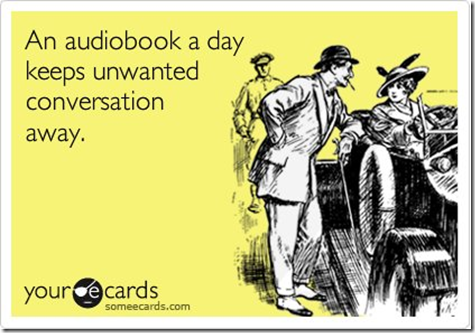Matthew Dicks's Blog, page 526
July 23, 2012
Three unjust presumptions
1. The cold person’s temperature preference always trumps the warm person’s temperature preference.
2. The parent who argues for greater frequency in the bathing of a child assumes unjust moral authority over the parent who argues for less frequent baths.
3. The person who does not cry is automatically the bad guy.
July 22, 2012
Psychoanalyzing my Moth GrandSLAM performance
Last Tuesday night I performed at The Moth GrandSLAM, and while I did well, finishing in second place, I also failed to tell my story in the way that I had planned for the first time in my brief Moth career. It was also the first time I had ever taken the stage for any occasion (and there have been many) and not felt entirely in control. My almost six-minute story ended in less than five minutes, and it was only through luck and a bit of verbal jujitsu that I was able to string together enough facts to keep some semblance of the actual story.
I assumed that it was because I had become emotional onstage, but there have been other times when emotions have gotten the best of me before. This time was different. I had also lost all focus onstage. I had begun to tremble. To be completely honest, I couldn’t keep track or entirely remember what I was saying. The words were coming from my mouth, but it was as if I was only half aware of what they were. Rather than telling the story, I had somehow drifted into the story and was listening to it as it was being told.
That’s not quite right, but it’s as close as I can get to describing the feeling.
It was all very strange, and ever since that night, I have been concerned that I had somehow lost my onstage mojo. I wondered if my inability to remain calm and focused in front of a large group of people was a sign of things to come. I worried that this may happen every time I took the stage to tell a story, and if that were the case, my brief storytelling career would be over.
Regardless of the scores that I received for Tuesday’s performance, I never wanted to feel that way again, and I was afraid that I might.
I wrote about my Moth experience a couple days after the performance, and a friend and psychologist who knows the story that I told onstage well weighed in on my experience. Her words brought immediate understanding and comfort to me.
She wrote:
With all you’ve been through, those events were among the most traumatic, if not the most. And the body remembers trauma, even when the mind has figured it out. For whatever reason, the Moth triggered some PTS.
What (Tuesday night and the actual experience) had in common were you as the focus/center of attention in both cases. While that’s usually fine, in fact you’re very comfortable in that place, you haven’t talked about that subject in front of a lot of people. I think the crowd plus the topic triggered your PTS. And it wasn’t simple PTS, it was prolonged, intense, potentially destructive, scary, icky, despicable, so-called “complex PTS ” in my business. It’s as if you had a body flashback.
I have suffered with post traumatic stress disorder since surviving an armed robbery in 1993. For years I would wake up every night screaming, and my nerves have always been on a hair trigger as a result. For more than a decade, my life was governed by a complex set of rules and precautions designed to keep me safe and in charge of my environment. I was an over-planner and hyper-vigilante to a level that is difficult to imagine.
When I met my wife, she finally convinced me to receive treatment for the condition, and after two years of incredibly hard work, I managed to recover. The nightmares, for the most part, have stopped. While I am still easily startled and remain more alert than most people, the rituals that I once undertook upon entering a new environment in order to feel safe have fallen by the wayside. Most important, the deafening click of an empty gun being fired, which used to fire off in my head at several times throughout the day, is thankfully no more.
But when my reputation and career came under attack in 2007, many of my PTS symptoms returned, and I went back to my therapist for a while in order to deal with the issue. It was a brief and surprisingly manageable flare-up, but my friend is right. The anonymous, public attack on me and my wife during the summer of 2007 was one of the most traumatic events in my life, and when I took the stage last Tuesday night to describe them, it was almost as if I were experiencing it all over again.
I find great comfort in this newfound awareness. While experiencing a post traumatic stress attack on stage is not something that I would ever want to happen again, it is unlikely that it ever would, since there are only a small handful of stories that I could tell that might trigger my PTSD. The story of the robbery, perhaps, which I have yet to tell, and possibly the car accident that nearly took my life in 1988. These two events have been identified by my therapist as instances that triggered my first bouts with PTSD, and so they are likely the only stories that might cause a similar reaction onstage. Even so, now that I am aware of this potential, I think I can be better prepared for it and manage it more effectively than I did on Tuesday night.
My hope is to tell the story of the summer of 2007 onstage again someday, and hopefully in a longer format. Ideally, I would need 10-12 minutes to tell the story in its entirety, and though I initially thought that I might never want to speak of it again in any context, the understanding of what happened on Tuesday night has already ended my concerns about taking the stage again and has me convinced that next time, I will likely become emotional again, but those emotions will not be accompanied by the lost, unfocused, detached, harrowing sensation of Tuesday night.
My hope is to be able to tell that story again someday, with all the emotion of Tuesday night, but to also tell the story in its grim but ultimately triumphant entirety.
Thanks to the understanding that my friend has provided, I think I can do that now.
The Baby Whisperer
My father-in-law is a baby whisperer, at least when it comes to my son.
This is not the first time he has garnered this level of focused joy from Charlie.
Utterly terrifying super power
If my wife had to choose one super power, it would be teleportation. I think this is a brilliant but selfish choice.
If you get to choose a super power of any kind, the only morally acceptable choice in terms of the fate of the world is the ability to see the future. The ability to warn about natural disaster and prevent manmade ones trumps the ability to pop into Manhattan for dinner in the blink of an eye.
Not by much. But it does.
Besides, teleportation is hardly a super power. Physicists have already achieved this teleportation years ago, as the video below demonstrates.
But be warned. If you are anything like me, this video may terrify you.
I have a great deal of respect for physicists, but the fact that particles are aware that they are being measured should scare the hell of everyone, physicists included, but they seem to accept this fact as if it were no big deal.
I’ll never understand this.
July 21, 2012
Least favorite animal
My least favorite animal is the koala bear. It sleeps 17 hours a day.
I have a hard time respecting anyone who is still in bed at 8:00 AM. How could I possibly respect any animal that sleeps that much?
Urine, drugs and advertising
Have you seen this item?
The Wizmark is an interactive urinal communicator that can an talk, sing, or flash a string of lights around a promotional message when greeting a visitor a “visitor.”
The large anti-glare, water-proof viewing screen is strategically located just above the drain to ensure guaranteed viewing without interruptions. Using the elements of surprise and humor in a truly unique location will allow Wizmark, in combination with your ad, to make a lasting impression on every male that sees it.
It’s an odd and amusing (and questionable) form of advertisement, but it’s hardly new. The Swisher Hygiene Company, a leader in restroom sanitation, has been placing urinal pads in restrooms for years with the message Don’t Do Drugs emblazoned upon each.
For a decade, I’ve found myself actually forced to urinate on a message that encourages me to avoid drug use.
Brilliant marketing plan, don’t you think?
July 20, 2012
The recent decision by The Boy Scouts of America has left this Boy Scout rudderless
I’m a man in conflict.
You may have heard the news:
The Boy Scouts of America on Tuesday announced that it will uphold its existing ban that excludes gays, something the group said was “absolutely the best policy” for the group.
“While the BSA does not proactively inquire about the sexual orientation of employees, volunteers, or members, we do not grant membership to individuals who are open or avowed homosexuals or who engage in behavior that would become a distraction to the mission of the BSA.”
I was a Boy Scout for more than ten years, and it was by far the most positive and meaningful experience of my entire life. I learned more from Scouting than from any school or college that I ever attended, and summers I spent at Camp Yawgoog were by far the best times of my life.
When I die, I have asked that my ashes be spread on the waters of Yawgoog Pond.
Yet the organization that I love and hope to one day become active in again with my son has upheld its ban on homosexuals, and I am not sure how to reconcile my overwhelming respect with and love for the organization with this stupid, discriminatory, hateful policy.
What’s even more frustrating is that it’s clear that this policy cannot and will not stand forever. The US military has overcome it’s discriminatory practices against homosexuals. States have begun permitting same sex marriage. The laws that discriminate against gays and lesbians are slowly beginning to crumble just as the laws that discriminate against African Americans fell generations ago. It is only a matter of time before we do away with these arcane and mindless policies entirely. Holding onto these policies and beliefs at this point only serves to identify your state or organization as backwards thinking and incapable of accepting the inevitable.
In twenty years, the policy that excludes homosexuals from Scouting will most certainly no longer exist. End the policy now and stand with the righteous or risk the legacy of those Southern states were desegregated through military intervention.
Until the policy is ended, however, what am I to do?
In the past, I have questioned the decision of people who choose to remain affiliated with religions that base their belief on a text filled with racist, sexist, homophobic doctrine. I have criticized religions that elevate books like the Bible as the Word of God while knowing full well that to follow its dictates to the letter would require them to stone many of their friends and relatives to death. I stand in opposition to people who use religious doctrine to justify their racist, sexist and homophobic beliefs while simultaneously ignoring the book’s less convenient dictates.
I have also challenged specific religious institutions who have adopted the same arcane policy that the Boy Scouts have recently upheld. If your church policy is homophobic, I have argued, find another church. Lord knows there are plenty from which to choose.
In response, I have been told that the good that these organizations do far outweighs policies, practices and teaching that even their congregants may openly question.
I have scoffed at this notion.
But now I find myself in the same position as many of these people. While not currently affiliated with the Boy Scouts of America, my fondness for the organization remains. Rarely does a day go by that I do not think about a moment from my time as a Boy Scout and smile. My experience with the Boy Scouts serves as the foundation upon which much of my life has been built. My greatest hope is that my son will someday love the Boy Scouts as much as I did and still do, and that I can participate in Scouting with him in a way my father never did for me.
But when that time comes, what should I do if this discriminatory policy remains in place?
Reconcile my participation in the organization by declaring that the Boy Scouts do far more good than harm?
Vow to promote change from inside the organization?
Argue that even though I do not agree with many of the laws of the United States, I remain a proud citizen of this country and will therefore take the same tact when it comes to Scouting?
None of this sounds right to me. It strikes me as a convenient use of semantics. But rejecting the Boy Scouts outright until this policy is changed is something I cannot see myself doing either. When I was fatherless and rudderless as a boy, Scouting was there for me and made me the man I am today. Ironically, I have little doubt that my stand against this homophobic policy and the internal conflict that it has generated would not exist had I not been taught by the Boy Scouts to respect and honor all people.
Thanks in part to Scouting, I know that a person’s sexual orientation is irrelevant when it comes to judging a person’s character and honor. Yet they have failed to learn this lesson themselves.
I am a man in conflict. The thing I loved and respected most as a boy has let me down. I am the son of a flawed and failing parent, the product of an organization that has failed to stand behind its tenet to “help other people at all times” and keep oneself “mentally awake and morally straight.”
I love the Boy Scouts with all my heart, but now that heart is broken.
An added benefit to a great story
July 19, 2012
Matthew Brown reads Matthew Green
The fact that I published MEMOIRS OF AN IMAGINARY FRIEND in the UK under the pseudonym Matthew Green and the narrator of the audio version of the book is Matthew Brown is odd. Or perhaps fitting.
Either way, I am happy to see Matthew Brown getting his due in the recent review of his performance in AudioFile magazine:
MEMOIRS OF AN IMAGINARY FRIEND
By Matthew Dicks
Read by Matthew Brown
Matthew Brown gives a winning performance as Budo, the imaginary friend of 8-year-old Max. Max has a spectrum disorder (probably autism). Budo, who immediately assures us he’s not imaginary, is the interpreter of and the link between Max’s world and the “typical” world. Brown is especially effective as Budo explains Max’s life. Max can’t stand to be touched, has rigid routines, likes silence and solitude, and retreats inside when too many choices overload his circuits. When Max loses control, his voice becomes shrill with a flat affect. Brown’s uncanny reproduction of Max’s high-pitched hysteria makes Max completely believable. Matthew Dicks offers an unusual and original look into a world filled with terrifying obstacles for a child whose brain function forces him to create his only comfort.
Now I feel like a loser
I read the obituary of Count Robert de La Rochefoucauld, who died last month, and I can’t help but think that I have accomplished nothing in my life by comparison.
“La Rochefoucauld, who died at the ripe old age of 88, escaped from Occupied France during World War II to join the Special Operations Executive. He then parachuted back into France on sabotage missions and twice faced execution, only to escape on both occasions, once dressed as a Nazi guard.”
No one likes a showoff.






